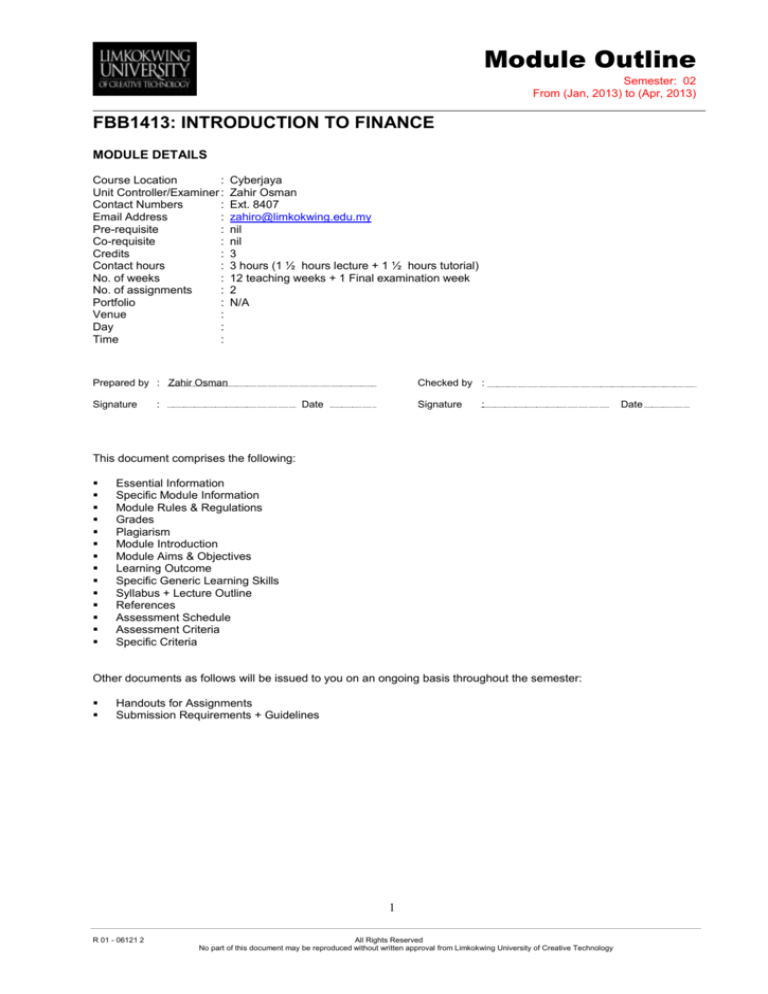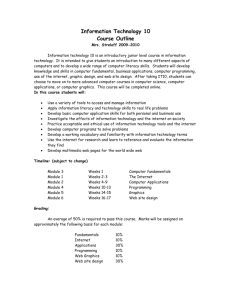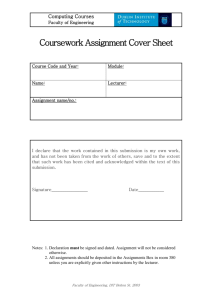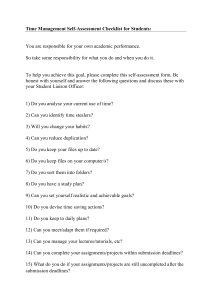
Module Outline
Semester: 02
From (Jan, 2013) to (Apr, 2013)
FBB1413: INTRODUCTION TO FINANCE
MODULE DETAILS
Course Location
:
Unit Controller/Examiner :
Contact Numbers
:
Email Address
:
Pre-requisite
:
Co-requisite
:
Credits
:
Contact hours
:
No. of weeks
:
No. of assignments
:
Portfolio
:
Venue
:
Day
:
Time
:
Cyberjaya
Zahir Osman
Ext. 8407
zahiro@limkokwing.edu.my
nil
nil
3
3 hours (1 ½ hours lecture + 1 ½ hours tutorial)
12 teaching weeks + 1 Final examination week
2
N/A
Prepared by : Zahir Osman
Signature
:
Checked by :
Date
Signature
:
This document comprises the following:
Essential Information
Specific Module Information
Module Rules & Regulations
Grades
Plagiarism
Module Introduction
Module Aims & Objectives
Learning Outcome
Specific Generic Learning Skills
Syllabus + Lecture Outline
References
Assessment Schedule
Assessment Criteria
Specific Criteria
Other documents as follows will be issued to you on an ongoing basis throughout the semester:
Handouts for Assignments
Submission Requirements + Guidelines
1
R 01 - 06121 2
All Rights Reserved
No part of this document may be reproduced without written approval from Limkokwing University of Creative Technology
Date
1.0
2.0
3.0
ESSENTIAL INFORMATION
All modules other than electives are 'significant modules'
As an indicator of workload one credit carries and additional 2 hours of self study per week. For
example, a module worth 3 credits require that the student spends an additional 6 hours per
week, either reading, completing the assignment or doing self directed research for that
module.
Submission of ALL assignment work is compulsory in this module. A student cannot pass this
module without having to submit ALL assignment work by the due date or an approved
extension of that date.
All assignments are to be handed on time on the due date. Students will be penalised 10
percent for the first day and 5 percent per day thereafter for late submission (a weekend or a
public holiday counts as one day). Late submission, after the date Board of Studies meeting
will not be accepted.
Due dates, compulsory assignment requirements and submission requirements may only be
altered with the consent of the majority of students enrolled in this module at the
beginning/early in the program.
Extensions of time for submission of assignment work may be granted if the application for
extension is accompanied by a medical certificate.
Overseas travel is not an acceptable reason for seeking a change in the examination schedule.
Only the Head of School can grant approval for extension of submission beyond the
assignment deadline.
Re-submission of work can only receive a 50% maximum pass rate.
Supplementary exams can only be granted if the level of work is satisfactory AND the semester
work has been completed.
Harvard referencing and plagiarism policy will apply on all written assignments.
SPECIFIC MODULE INFORMATION
Attendance rate of 80% is mandatory for passing module.
All grades are subject to attendance and participation.
Absenteeism at any scheduled presentations will result in zero mark for that presentation.
Visual presentation work in drawn and model form must be the original work of the student.
The attached semester program is subject to change at short notice.
MODULE RULES AND REGULATIONS:
Assessment procedure:
These rules and regulations are to be read in conjunction with the UNIT AIMS AND
OBJECTIVES
All assignments/projects must be completed and presented for marking by the due date.
Marks will be deducted for late work and invalid reasons.
All assignments must be delivered by the student in person to the lecturer concerned. No other
lecturer is allowed to accept students’ assignments.
All tests/examinations are compulsory.
2
R01 – 061212
All Rights Reserved
No part of this document may be reproduced without written approval from Limkokwing University of Creative Technology
4.0
Students must sit the test/examination on the notified date.
Students are expected to familiarise themselves with the test/examination timetable.
Students who miss a test/examination will not be allowed to pass.
Any scheduling of tutorials, both during or after lecture hours, is TOTALLY the responsibility of
each student. Appointments are to be proposed, arranged, confirmed, and kept, by each
student. Failure to do so in a professional manner may result in penalty of grades. Tutorials
WITHOUT appointments will also NOT be entertained.
Note that every assignment is given an ample time frame for completion. This, together with
advanced information pertaining deadlines gives you NO EXCUSE not to submit assignments
on time.
GRADES
All modules and assessable projects will be graded according to the following system. With respect
to those units that are designated 'Approved for Pass/Fail' the grade will be either PA or F:
80 – 100
Grade
A
Numeric Grade
4.00
75 – 79
A-
3.67
70 – 74
B+
3.33
65 – 69
B
3.00
60 – 64
B-
2.67
55 – 59
C+
2.33
50 – 54
C
2.00
45 – 49
C-
1.67
40 – 44
D
1.00
0 – 39
F
Pass0.00
EXP
Description
Pass with Distinction
Pass with Merit
Pass
Fail
Exempted
PX
Pass after extra work is given and passed
X
Ineligible for assessment due to unsatisfactory attendance
D
Deferred
W
Withdraw
DNA
Did Not Attend Module
DNC
Did Not Complete Module
3
R01 – 061212
All Rights Reserved
No part of this document may be reproduced without written approval from Limkokwing University of Creative Technology
5.0
PLAGIARISM, COPYRIGHT, PATENTS, OWNERSHIP OF
PROJECT, THESES & WORKS
WORK:
STUDENT
MAJOR
See LIMKOKWING, HIGH FLYERS HANDOUT, Page 10.
6.0
MODULE INTRODUCTION
This is an introductory module in which students obtain very basic knowledge on subjects related to
financial management including financial markets, interest rates, return and risk in investments,
bond and stock valuation, cost of capital, and capital budgeting. Students are expected to attain a
clear and basic understanding of the essentials of financial decision making. Emphasis is laid on
the factors to be considered on cash flow estimation and the mechanics of discounting those cash
flows in valuing certain financial assets or projects, before choosing alternatives or arriving at a
feasible decision.
MODULE AIMS AND OBJECTIVES
Upon the completion of this module, students will:
Be able to develop an understanding of both theory and practice in finance
Be able to provide students with practices on evaluating certain financial assets and simple
projects.
Be able to deal with the fundamentals of finance and its effects on business decisionmaking.
LEARNING OUTCOME
Upon the completion of the module, Students should be able to demonstrate:
9.0
Thorough understanding of the financial environment, including equity and debt markets,
financial institutions, and interest rates.
Able to grasp the concept of the time value of money including present value and future value
analyses of annuities and uneven cash-flows over time.
Able to compute bond and stock values including coupon rates, coupon payments, yields,
risk, bond ratings, price discounts, and premiums.
Able to grasp the concept of a business’ cost of capital and the sources for small and large
firms.
Able to assess basic projects by applying capital budgeting for evaluation of long-term fixed
asset investments including both independent and mutually exclusive decisions.
SPECIFIC GENERIC LEARNING SKILLS
Upon the completion of this module, students should be able to identify the right investment
opportunities and be able to make the risk-return assessments.
4
R01 – 061212
All Rights Reserved
No part of this document may be reproduced without written approval from Limkokwing University of Creative Technology
UNIT SYLLABUS + LECTURE OUTLINE:
Week:
LECTURE 1:
Lecture Synopsis:
1
AN OVERVIEW OF FINANCIAL MANAGEMENT
Goals of the firm, legal forms of business organisation, principles that form financial
management, finance and multinational firms.
Tutorial:
Week:
LECTURE 2:
Lecture Synopsis:
Tutorial:
2
UNDERSTANDING FINANCIAL STATEMENTS AND CASH FLOWS
Income statement, balance sheet, cash flows.
Week:
LECTURE 3:
Lecture Synopsis:
3 RATIO ANALYSIS
Purpose of financial analysis, measuring key financial relationships, limitations of financial
ratios
Tutorial:
Week:
LECTURE 4:
Lecture Synopsis:
Tutorial:
4 TIME VALUE OF MONEY CONCEPTS
Week:
LECTURE 5:
Lecture Synopsis:
Tutorial:
5 TIME VALUE OF MONEY CONCEPTS
Week:
6
. Present Value & Future Value concepts, Investment Decision Making in Practice
Present Value & Future Value concepts, Investment Decision Making in Practice
MID TERM BREAK
Week:
7
Week:
LECTURE 6:
8 BOND VALUATION
Lecture synopsis:
Expected return, measurement of risk and return, risk and diversification, investors
required rate of return.
Tutorial:
Week:
LECTURE 7:
Lecture synopsis:
Tutorial:
Week:
LECTURE 8:
Lecture Synopsis:
MID-TERM EXAM
9 BOND VALUATION
Expected return, measurement of risk and return, risk and diversification, investors
required rate of return.
10
CAPITAL BUDGETING CONCEPTS
Finding profitable projects, capital budgeting decision criteria, capital rationing, ethics in
capital budgeting, cash flows in capital budgeting
Tutorial:
Week:
11 REVISION
5
R01 – 061212
All Rights Reserved
No part of this document may be reproduced without written approval from Limkokwing University of Creative Technology
LECTURE 9:
Lecture Synopsis:
Week:
12
REVISION
Week:
13
FINAL EXAMINATION WEEK
11.0 ESSENTIAL TEXT
Arthur J. Keown, John d. Martin, J, William Petty, Foundations of Finance, 7th edition, 2010.
11.1 ADDITIONAL TEXT FOR REFERENCE
Brigham & Houston, Fundamentals of Financial Management, 10th Edition, Thomson, 2007
Brigham & Ehrhardt, Financial Management, Theory & Practice, 11th Edition, South-Western, 2005
Moyer, McGuigan & Rao, Fundamentals of Contemporary Financial Management, 2nd Edition, 2007
12.0 ASSESSMENT SCHEDULE
Assessment Description
Issue Date
Due Date
%
Individual Assignment
Week 8
10%
Group Assignment
Week 11
30%
Mid-Term Exam
Week 7
20%
Final Exam
Week 13
40%
Total
100%
13.0 ASSESSMENT CRITERIA
Process of grading and criteria used to determine the grades, passes and high distinctions.
14.0 SPECIFIC CRITERIA
Each assignment will be handed out with the project brief and will vary, depending on the
teaching and learning objectives of the specific assignment.
Each student will receive a completed assessment sheet back with their marks, thereby giving
student feedback on each set criterion and the project as a whole.
Marks for each project will be posted on the Bulletin Board with student number within 2 weeks
of hand-in date.
6
R01 – 061212
All Rights Reserved
No part of this document may be reproduced without written approval from Limkokwing University of Creative Technology
7
R01 – 061212
All Rights Reserved
No part of this document may be reproduced without written approval from Limkokwing University of Creative Technology











